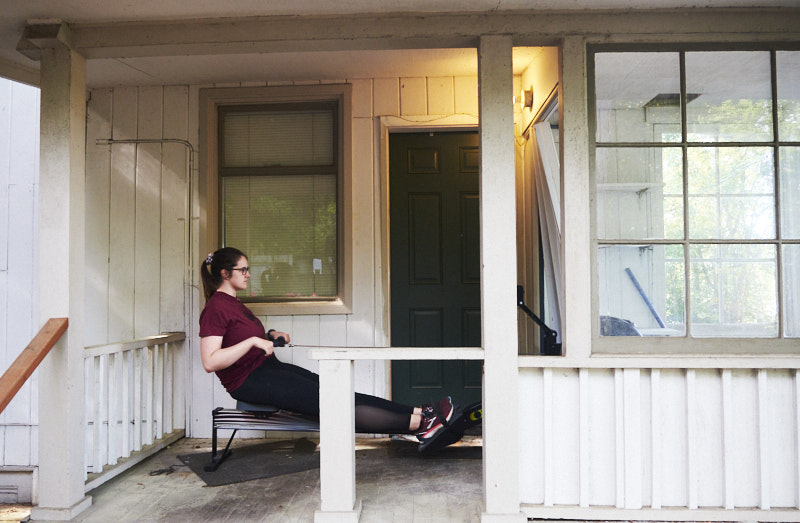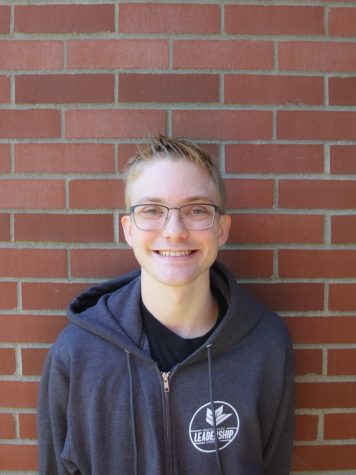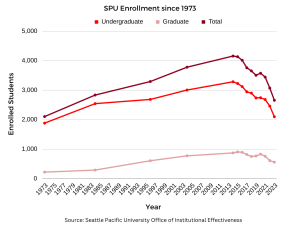Training by any means necessary
Machines allow Falcon rowers to continue training as they wait to get on water again
May 19, 2020
On a sunny spring morning, birds chirp, the trees sway in the wind and the water in the canal under the Fremont Bridge slowly splashes and rolls. Usually, before the perimeter of the canal is surrounded by runners, bikers and people soaking up the sun, Seattle Pacific University’s rowing team is on the water, training to constantly improve their speed in the water and continue their quest for a national championship.
This year, while the other elements may still be at the canal, the Falcons rowing team is not. Due to the COVID-19 pandemic, they are training a bit differently.
The team did manage to get in one regatta this year when they traveled to Pacific Lutheran University on March 7, and their various crews won every single race, including two huge wins over rivals Western Washington University.
But then the run of cancellations began.
Senior Julie Renne said that the cancellation of the season came quickly and from out of nowhere. One by one, practices, regattas and, eventually, the entire season were canceled. Renne said that while the cancellation came as a surprise at the time, she believes that the NCAA made the right decision.
With the season canceled, rowers would be able to take an extended break and begin preparation for the next season whenever the quarantine restrictions were lifted where the athletes were living. But as many athletes know, a season never really ends.
Yet with no way to be outside and be with teammates on the water, training is now done in a different way.
According to team captain and senior All-American rower Gillian Edgar, the solution comes in the form of ergonomic rowing machines, “ergs” for short. Since the Royal Brougham shellhouse is currently closed, rowing athletes that live locally, and could fit a rowing machine into a vehicle, were able to take one back to their home.
Renne said that since rowing is a sport that requires so much specific equipment — like being in a boat on the water with others — it is difficult to train without a rowing machine. These machines allow rowers to simulate pulling an oar through the water, and keep them on track and in shape when regattas begin again.
Those who had to fly home are still able to train without the machines by running, biking and lifting weights.
Renne lives with five other rowers in an apartment about one mile from campus and she and her teammates were able to arrange a room to put two rowing machines, a stationary bike and the weights in, creating a home gym.
Still, Renne admitted that it is hard to find motivation to work out without all of her teammates on the water.
“A lot of the reason as to why I would push myself so hard during practice was knowing and seeing that my teammates were all doing the same,” Renne said. “Every one of the girls on the team makes me want to be better and work harder and it becomes difficult to continue to push myself without inspiration or competitive aspect.”
In order to combat feelings of loneliness and build the connection of the team, the SPU rowers are still meeting virtually every week, watching webinars and discussing them as a group. The focus is on much of the internal things that come along with sports, like team-building and motivation.
According to Renne, these sessions include “talking about rowing and everything that comes along with it.” But unfortunately, these training sessions and meetings cannot fully replicate the feeling of being out of the water with teammates.
“It’s a weird balance between crazy drive and unbelievable serenity,” Renne said. “A lot of the race is actually a blur. Our races are such a short length of time that what is really important is the months and months of work you have put in before the race.”
Renne will be enrolling in a masters program at SPU and is still eligible to compete on the team next year. Until next year comes, Renne and the team will continue to train until they can come together and compete once again.



























































































